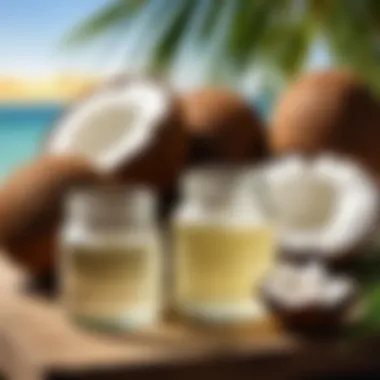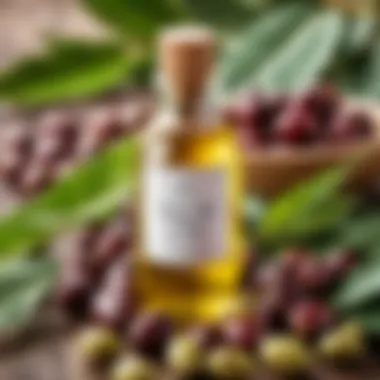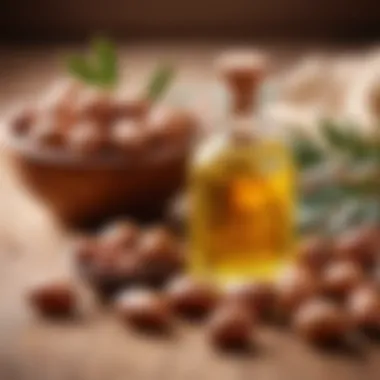Essential Oils for Optimal Hair Health Benefits


Intro
In today's world, where personal grooming holds significant importance, hair care has become a vital aspect of self-presentation and confidence. An increasing number of individuals are turning to natural solutions for their hair health, and among these, essential oils stand out as prime candidates. Essential oils offer an array of benefits that cater not only to aesthetics but also to the scalp's health and hair vitality.
Understanding the advantages of essential oils is crucial. Various oils provide unique nutritional benefits to the hair. This article provides insights into different oils and highlights how they can be integrated into a hair care routine. Furthermore, an exploration of their applications will assist readers in making informed choices suitable for their hair types and concerns.
Ürün İncelemesi
Ürün Tanıtımı
Essential oils are concentrated liquids extracted from plants. They capture the plant's natural scent and essence. When it comes to hair care, these oils serve multiple functions. They can nourish, strengthen, and even promote hair growth. For example, coconut oil is known for its moisturizing properties, while castor oil is celebrated for its ability to stimulate growth. Each oil possesses distinct properties that can cater to specific hair needs, making them popular in both conventional and alternative hair care regimes.
Ürün Özellikleri
The benefits of essential oils can be attributed to their rich composition, which includes vitamins, fatty acids, and antioxidants. Below is a brief overview of some oils commonly used in hair care:
- Coconut Oil: Rich in fatty acids, it penetrates the hair shaft easily, providing deep hydration.
- Castor Oil: Contains ricinoleic acid, promoting hair growth and preventing breakage.
- Argan Oil: Loaded with essential fatty acids and vitamin E, it nourishes and adds shine to hair.
- Peppermint Oil: Known for its stimulating qualities, it enhances blood circulation to the scalp.
- Tea Tree Oil: Effective in combating dandruff and maintaining a healthy scalp.
Using these oils can enhance the overall health of hair. However, it is also essential to address the methods of application.
Güzellik İpuçları
Doğal Güzellik Yöntemleri
Integrating essential oils into a hair care routine can be straightforward. Here are several methods:
- Scalp Massage: Mix a few drops of essential oil with a carrier oil, like jojoba or olive oil, for a nourishing scalp treatment.
- Hair Masks: Combine essential oils with ingredients like yogurt or honey to create a revitalizing hair mask.
- Conditioning: Add essential oils to your regular conditioner for an extra boost in nourishment.
Sağlıklı Beslenme ve Güzellik
It is important to remember that internal health contributes to external beauty, including hair health. A balanced diet rich in proteins, vitamins, and minerals can enhance hair's strength and appearance. Foods such as eggs, nuts, and leafy greens can work in tandem with essential oils to promote healthy hair growth.
"Healthy hair is a reflection of overall well-being, nurtured by both external treatments and internal nutrition."
Preface to Hair Nourishing Oils
The focus on hair nourishing oils reveals not just contemporary trends but also deep-rooted practices that span across cultures and time. Understanding hair health is crucial, as it encompasses factors such as hair type, scalp condition, and external influences. Every individual's hair is different, requiring tailored approaches for optimal care.
Oils have long been recognized for their numerous benefits in hair maintenance. These essential oils offer direct nutritional advantages that can improve the overall condition of hair. Their role is multifaceted, from conditioning to providing protective benefits against environmental stressors. With the growing market of hair care products, it is essential to examine how these oils play a pivotal part in enhancing hair vitality and shine.
Understanding Hair Health
Healthy hair begins at the root, quite literally. A crucial aspect of hair health is the scalp, which requires attention just as much as the strands themselves. The scalp is home to hair follicles where growth initiates. If the scalp is unhealthy, hair strands may suffer. Factors such as pollution, stress, and improper nutrition can compromise scalp health and subsequently affect hair condition.
Good hair health ensures strength and resilience. This includes having adequate hydration, elasticity, and avoiding damage from heat or chemical treatments. Nutritional deficiency can manifest in hair thinning or lackluster appearance. Thus, it is essential to focus on both internal and external aspects to maintain overall hair health.
The Role of Oils in Hair Care
Oils occupy a significant space in hair care routines. They offer natural solutions to numerous hair concerns. Whether it be for combating dryness, enhancing shine, or promoting growth, oils serve multiple functions.
Benefits of oils in hair care include:
- Moisture retention: Oils provide a protective layer that locks in moisture, reducing frizz.
- Nutritional support: Oils are packed with vitamins and fatty acids that nourish hair.
- Natural ingredients: Many oils are derived from plants, making them typically gentler than synthetic ingredients.


Using oils can also assist in managing scalp conditions. For instance, they can soothe irritation and maintain balance in oil production. Overall, the integration of nourishing oils into hair care practices can lead to significant improvements in hair strength, shine, and overall health.
"Incorporating oils into your hair care regimen can transform its health and appearance with consistent application."
Types of Nourishing Oils
Exploring the types of nourishing oils is crucial in understanding their unique roles in promoting optimal hair health. Each oil offers specific benefits, catering to different hair needs and concerns. A detailed examination of these oils allows readers to select the right one based on their individual hair type and challenges. These oils not only improve hair’s appearance but also enhance its structural integrity, making them indispensable in hair care routines.
Coconut Oil
Benefits for hair strength
Coconut oil has long been associated with enhancing hair strength. It is high in lauric acid, which helps it penetrate hair strands more effectively than other oils. This penetration capability promotes the overall integrity of the hair shaft, reducing protein loss during washing. Thus, coconut oil serves as a beneficial choice for individuals looking to minimize breakage while improving the texture of their hair. However, too much application may lead to greasy hair, necessitating careful measurement of use.
Moisture retention properties
The moisture retention properties of coconut oil are significant in its role as a hair care oil. It acts as a barrier, reducing water loss from the hair follicles. This is key for maintaining hydration, especially for dry or damaged hair. Users often find their hair feels softer and appears shinier after consistent use. Nevertheless, individuals with oily hair may need to be cautious, as excessive oil can lead to buildup on the scalp.
Argan Oil
Rich in fatty acids
Rich in fatty acids, argan oil is known for its exceptional moisturizing capabilities. These fatty acids help nourish the hair, making it particularly beneficial for those with frizzy or dry hair types. Furthermore, argan oil is often praised for its ability to restore luster and manageability to hair, making it a popular choice in hair care products. However, its richness might not suit everyone, particularly those with fine hair, as it could weigh the hair down.
Antioxidant properties
The antioxidant properties of argan oil contribute significantly to hair health. These antioxidants help protect hair from environmental damage, often leading to dullness and breakage. Thus, incorporating argan oil into a hair care regimen can mitigate oxidative stress on the hair. While it is largely recognized for its protective features, one must ensure to use it in moderation, as too much can lead to a greasy finish.
Jojoba Oil
Similarity to natural scalp oils
Jojoba oil is unique in its similarity to the natural oils produced by the scalp. This resemblance allows it to provide effective nourishment while maintaining the scalp's balance. Its application can help regulate oil production, making it an excellent choice for both dry and oily hair types. Importantly, the ability to mimic natural oils assists in creating a healthy environment for hair growth. Excessive use, however, may still lead to slightly oily hair; thus, moderation is recommended.
Balancing oiliness
Jojoba oil is especially effective at balancing oiliness in the hair. It works by conditioning the hair without overloading it with moisture, which is particularly helpful for people with oily scalps. This balance is crucial for preserving healthy hair without causing greasiness. Many people find it beneficial for preventing excess buildup, yet individual responses may vary, as some might find it insufficient for highly damaged hair.
Castor Oil
Promotes hair growth
Castor oil is widely recognized for its potential to promote hair growth. Its rich composition, especially with ricinoleic acid, stimulates blood circulation in the scalp. This stimulation can encourage better nutrient delivery to hair follicles, potentially leading to improved hair density and growth. While many users report positive results, scientific studies are limited, and individual experience may differ.
Strengthens hair follicles
Another essential benefit of castor oil is its ability to strengthen hair follicles. By providing necessary nutrients, it helps reduce hair fall and supports overall follicle health. The thickness of castor oil can create a protective barrier around the hair, which can minimize breakage. Some individuals may find it difficult to wash out due to its viscosity, thus requiring effective cleansing methods post-application.
Olive Oil
Hydration benefits
Olive oil is often lauded for its hydration benefits to the hair. Rich in emollients, it can soften and moisturize hair, making it easier to manage and style. Regular use can lead to hydrated hair that appears smooth and vibrant. However, those with fine hair should be cautious, as olive oil can weigh down hair, leading to a lack of volume.


Scalp health
Maintaining scalp health is essential for overall hair wellness, and olive oil contributes significantly in this aspect. Its anti-inflammatory properties can soothe the scalp, reducing conditions like dandruff and irritation. This can create a better environment for hair to grow. Despite its advantages, care should be taken to avoid excessive application, as this can lead to greasiness.
By understanding the specific benefits of various oils, individuals can make informed choices about their hair care regimen to promote health and vitality.
Scientific Basis of Oil Benefits
Understanding the scientific basis of why oils benefit hair health is essential for anyone interested in natural hair care solutions. Oils have shown a wealth of advantages, and their nutritional components play a crucial role in hair maintenance. The benefits derived from oils can be attributed to the specific components they possess. Therefore, focusing on both the nutritional value of oils and how they interact with hair can provide a more informed perspective on their use.
Nutritional Components of Oils
Fatty acids
Fatty acids are critical building blocks of oils. They are essential in the nourishment process of hair. These molecules help strengthen hair strands, enhance elasticity, and reduce breakage. Coconut oil, for example, is particularly high in lauric acid, making it a popular choice for hair treatments.
The unique characteristic of fatty acids lies in their ability to penetrate hair more effectively than many other types of oils. This penetration is vital because it allows the oil to deliver vitamins and nutrients directly to the hair shaft, improving health from within. While fatty acids enhance moisture retention, they can also render an oily feel if not used in moderation, so users should be aware of the quantity applied.
Vitamins
Vitamins in nourishing oils, such as vitamin E and vitamin A, contribute significantly to overall hair health. These vitamins act as antioxidants, protecting the hair from free radical damage and oxidative stress. Vitamin E, known for its regenerative properties, helps maintain a healthy scalp, thus preventing hair loss.
The key characteristic of vitamins in oils is their capacity to promote healing and strength. They help improve blood circulation on the scalp and aid in the production of collagen. However, while vitamins are beneficial, excessive application can lead to buildups, which may hinder their effectiveness. It is essential to balance the use of vitamin-rich oils in regular hair care routines.
Mechanisms of Action
Penetration capabilities
The penetration capabilities of oils are vital for effective hair treatment. By permeating the hair shaft, oils ensure that beneficial nutrients reach the cuticle. This is especially important for hair types that may be coarse or damaged.
One of the primary advantages of oils that penetrate well is their long-lasting effects on the hair structure. For example, argan oil boasts impressive penetration properties, making it a highly sought-after oil in hair care products. However, some oils may not penetrate as effectively, which is something to consider when choosing oils for specific hair needs.
Moisture sealing
Moisture sealing is another significant action enabled by oils. They create a barrier on the hair shaft that retains moisture, effectively preventing dryness and frizz, leading to healthier-looking hair. The ability to seal moisture helps maintain hydration levels after washing or treatment.
Oils that excel in moisture sealing, like castor oil, are beneficial for those struggling with dry hair and scalp. Although moisture sealing is advantageous, an over-application can lead to weighed-down hair, which impairs volume and movement. Users should find an appropriate balance to achieve maximum benefits without excess buildup.
In summary, understanding the scientific foundations behind oil benefits not only highlights the nutritional components and their mechanisms of action but also prepares users for better application techniques.
Application Techniques
Understanding application techniques is vital in harnessing the benefits of essential oils for hair care. How you apply these oils can enhance their efficacy and ensure your hair receives optimal nourishment. Different techniques can cater to specific hair types and concerns, thus customizing the overall hair care experience.
Pre-Wash Treatments
Pre-wash treatments involve applying oils before shampooing. This technique helps to protect hair from the harsh components found in many cleansers. Oils such as coconut and olive are particularly effective in this scenario. They create a barrier that reduces moisture loss during washing.
To apply, use a generous amount of the chosen oil and focus on the ends of your hair, which often suffer from dryness. Leave it on for at least 30 minutes before your wash, or overnight for deeper penetration. This method not only maintains moisture but also enhances shine and manageability. Regular pre-washing can transform the texture of hair and may prevent breakage, especially for those with curly or coarse hair.
Leave-In Products
Applying oils as leave-in products is another effective technique. This approach allows the oils to continue nourishing the hair throughout the day. Argan and jojoba oils are popular choices for this purpose due to their lightweight nature. Unlike heavier oils, they do not leave hair feeling greasy or weighed down.


To use oils as leave-in treatments, apply a few drops to damp hair after washing. Focus on the mid-lengths to ends. This can help tame frizz and improve overall hair elasticity. Over time, consistent use can lead to healthier, more resilient hair. Additionally, leave-in application can add a subtle shine, which further enhances hair appearance.
Scalp Massage Techniques
Scalp massage techniques not only serve as an application method but also improve scalp health. Massaging oils like castor or tea tree into the scalp can promote circulation and stimulate hair follicles. This practice has the dual benefits of enhancing oil absorption and encouraging hair growth.
To perform a scalp massage, apply a small amount of oil directly onto the scalp. Using your fingertips, gently massage in circular motions for about 10-15 minutes. This is also a great way to relieve stress, making it an enjoyable part of your hair care routine. Regular scalp massages can also help alleviate dry scalp and flakiness, ensuring a healthier foundation for hair growth.
Effective application techniques enhance the nutritional benefits of oils and optimize hair health.
Employing these specific techniques in your routine can help maximize the effectiveness of essential oils. Whether you opt for pre-wash treatments, leave-in applications, or scalp massages, understanding how to use these oils properly is crucial. Every method serves a distinct purpose and, when used consistently, can lead to significant improvements in overall hair health.
Risks and Considerations
Understanding the risks and considerations associated with essential oils is crucial for anyone looking to integrate them into their hair care regimen. While these oils offer many benefits, such as nourishment and moisture, they can also present potential side effects that should not be ignored. Awareness of these risks can help users make informed decisions, ensuring a safe and effective experience with hair oils.
Potential Allergies
Allergic reactions are one of the primary concerns when using essential oils for hair care. Even oils that are widely regarded as safe may cause irritation or allergic responses in some individuals. Symptoms can range from mild redness and itching to more severe reactions such as blistering.
Common allergens in essential oils may include:
- Lavender Oil: Known for its calming effects, but can cause reactions in sensitive individuals.
- Tea Tree Oil: While praised for its antiseptic properties, it can irritate certain skin types.
- Peppermint Oil: Its cooling effect may cause discomfort in those with sensitive scalps.
Before applying any oil, it is advisable to perform a patch test. This involves applying a small amount of diluted oil to a discrete area of skin, such as the inner wrist, and monitoring for adverse reactions over 24 hours. If any discomfort arises, it is best to avoid using that particular oil on the hair or scalp.
Interactions with Other Products
Another important consideration is how essential oils interact with other hair care products. Mixing essential oils with shampoos, conditioners, or styling products can potentially alter the efficacy of either the oil or the product they are combined with.
Key considerations include:
- Silicone-Based Products: Using oil on hair already treated with silicone can lead to buildup, reducing the oil's penetrative ability.
- Chemical Treatments: Individuals who use relaxers, dyes, or other chemical treatments should approach essential oils with caution. Certain oils may interact negatively with these chemicals, affecting both the treatment and hair health.
- Thermal Styling Products: Adding oils prior to heat styling can impact the heat’s effectiveness. Some oils may even degrade under high temperatures, leading to further damage.
"The combination of essential oils with other products should be guided by an understanding of their chemical properties and the potential for interactions."
Ultimately, being mindful of allergies and product interactions can significantly enhance the benefits of using essential oils in hair care. Proper knowledge helps in tailoring usage for optimal results.
Finale and Recommendations
Recognizing the advantages of integrating these oils is crucial. For instance, coconut oil is celebrated for its deep moisturizing properties, while argan oil is known for its rich antioxidants that support overall hair health. These oils can serve as powerful allies in combating common hair problems such as split ends and lackluster strands.
"Proper application and awareness of potential side effects are also key components of a successful hair care regimen."
When considering oil application, it’s vital to prioritize personal hair type and needs.
Summarizing Nutritional Benefits
Essential oils are packed with nutrients that promote hair vitality. Key components to note include:
- Fatty Acids: These acids are important for maintaining moisture levels in the hair and preventing dryness.
- Vitamins: Essential oils often contain vitamins A, E, and K, which are beneficial for hair growth and strength.
For example, jojoba oil is particularly effective due to its structure, mimicking natural scalp oils. This helps balance the scalp's oil production, leading to healthier hair. Each oil's unique composition plays a significant role in how it interacts with your hair, yielding different results based on its application.
Choosing the Right Oil for Your Hair Type
Selecting the appropriate oil requires a clear understanding of your hair's specific requirements. Factors to consider include:
- Hair Type: Is your hair straight, wavy, or curly? Different types of hair may respond better to specific oils.
- Scalp Condition: An oily scalp may benefit from lighter oils like grapeseed oil, while dry scalps may require richer options such as castor oil.
- Hair Issues: If your hair is damaged or over-processed, oils that offer deep restoration, like olive oil or argan oil, can be particularly helpful.
In summary, look at your individual hair needs and the specific nutrients each oil provides. This personalized approach will ensure optimal results, enhancing the overall health and appearance of your hair. By making well-informed choices, individuals can effectively harness the benefits of nourishing essential oils.







